
- Major reservoirs like Lake Powell and Lake Mead, which store water from the Colorado River, are experiencing a major decline in water levels thanks to a megadrought exacerbated by climate change.
- The Bureau of Land Management projects 3% chance that Lake Powell's water levels fall below the minimum level necessary for the lake's Glen Canyon Dam to generate hydroelectricity next year. In 2023, the chance of a power shutdown jumps to 34%.
- Other large bodies of water in the U.S. West have also hit record lows this year and triggered concern about power generation, including Lake Oroville in California.

Falling water levels at Lake Powell, the massive reservoir on the Utah-Arizona border, could cause its dam to stop generating hydroelectric power in 2023, according to new projections by the U.S. Bureau of Reclamation, an agency of the Interior Department.
Amid a historic megadrought and record-breaking temperatures in the U.S. West, exacerbated by climate change, Lake Powell and Lake Mead on the Colorado River are experiencing a record decline in water levels.
Get top local stories in Philly delivered to you every morning. >Sign up for NBC Philadelphia's News Headlines newsletter.
The Bureau's projections show a 3% chance that Lake Powell's water levels fall below the minimum level necessary for the lake's Glen Canyon Dam to generate hydroelectricity next year. In 2023, the chance of a power shutdown jumps to 34%.
If water levels drop below 3,490 feet, the so-called minimum power pool, the Glen Canyon Dam, which supplies electricity for about 5.8 million customers in the inland West, will no longer be able to generate electricity. Lake Powell's water levels are projected to drop to roughly 3,536 feet by the year's end, according to the Bureau's data.
"The latest outlook for Lake Powell is troubling," the Bureau's Upper Colorado Basin Regional Director Wayne Pullan said in a statement. "This highlights the importance of continuing to work collaboratively with the Basin States, Tribes and other partners toward solutions."
Money Report
Other large bodies of water in the U.S. West have also hit record lows this year and triggered concern about power generation, including Lake Oroville in California. In August, the state shut down the lake's Hyatt Power Plant because water levels fell near the minimum necessary to generate power.
The federal government also recently declared a water shortage at Lake Mead for the first time ever due to drought conditions. The declaration triggered water supply cuts that will mostly impact Arizona farmers starting next year.
The projections for Lake Powell come as Western lawmakers call on President Joe Biden and the Federal Emergency Management Agency to declare a drought disaster in the West, which would provide aid to states facing water cuts.
"There is little to no livestock feed available in the West, farmers are considering selling their livestock or land, and many species of wildlife are suffering from wildfires and lack of water," Democratic Reps. Joe Neguse of Colorado and Jared Huffman of California wrote in a letter to the president in August.






